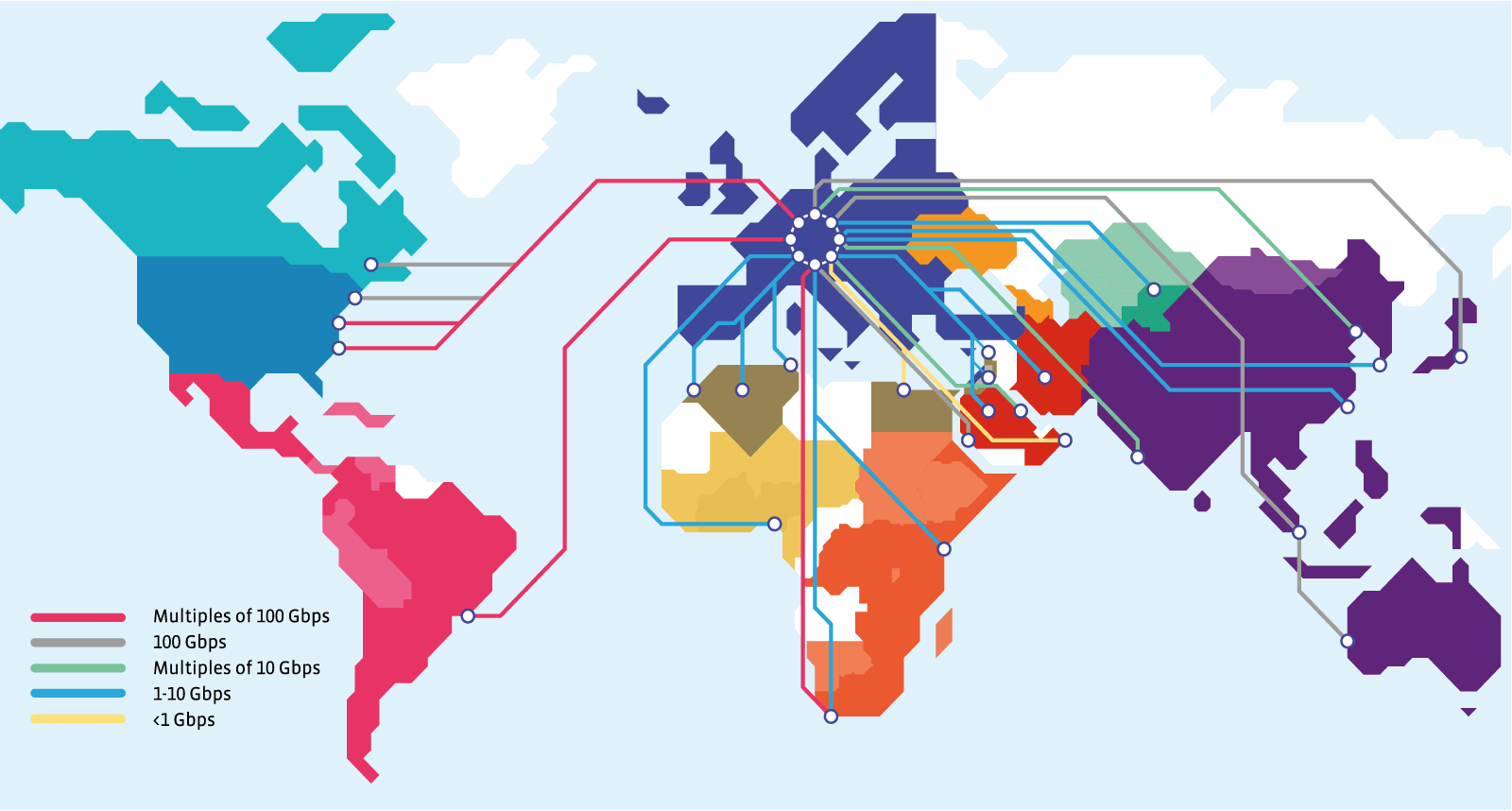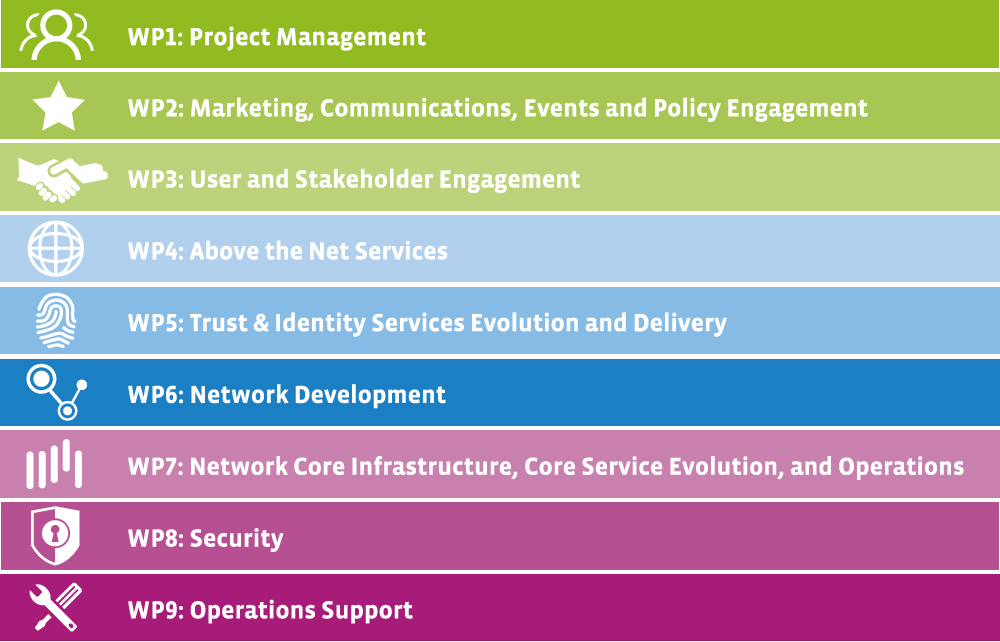Ready for the Future: GN5 Projects Build on a Long History of Success
In January, 2023, the European Union‘s Horizon Europe program announced the “GN5-1” and “GN5-1C1” projects, the next stage in the GN project series. For more than 20 years, Europe’s national research networks have operated and developed a shared backbone infrastructure under the auspices of the GÉANT Association. The goal? The best network and the best services for research and education in Europe.

GÉANT global connectivity map: The backbone network GÉANT connects European and worldwide NRENs (National Research and Education Networks) with each other | Source: GÉANT Association
With their many services, national research and education networks (NRENs) – of which the DFN association is a member – have played a significant role in the rapid development of research and education for many years. The European Union (EU) supports collaboration between the various national research network in Europe through funding the so-called GN-project series. The series began in 2000 with the GN1 project, and more than 20 years later, we are entering the fifth round with GN5. Over the years, the projects have experienced many changes and have by no means gone on autopilot – each application, every review, and the anchoring in the EU work programs always provide a new challenge. Since 2014, the GN-projects have been coordinated by the GÉANT Association, which serves as the consortium of all European research networks. With the projects GN5-1 and GN5-IC1 starting in January 2023, the first phase of the series’ fifth installment – GN5 – officially began. As part of the kick-off, 74 task leaders, work package leaders, and coordinators met Jan 31-Feb. 1, 2023 in Dorderecht, Netherlands for the first project management convention. The goal was to define the framework for the two-year GN5-1 project, integrate new colleagues and develop a common understanding of the goals and division of labor for the project duration.
EU-Sponsorship Program for Research and Innovation – Horizon Europe
The GN5 project series is financed by Horizon Europe – the most important financial support program in the EU for research and innovation. In advance of the project series, a framework partnership agreement (FPA) was established between the European Commission and the GÉANT Association that defined the strategic goals over the course of the project as well as the roles played by the GÉANT Association and its members. The FPA is often referred to as an “empty envelope,” in that it only prepares the way for formal calls for proposals in the Horizon Europe work programs for the individual phases of the project series. The FPA does not define the exact run time or funding amount of the individual project phases. The project‘s key goals are summarized into six focus areas.
GN5-1 and GN5-IC1 at Glance
The main goal of the GN5-1 and GN5-IC1 projects is the operation and further development of a high-performance, secure, cost-efficient connection network between European national research networks and their connection to the global internet. This infrastructure must regularly be evaluated and built out based on the ever-increasing throughput capacity placed on it – with the fastest connection going into the terabit range. Additionally, GN5-1 is designed to focus on the testing and organization of innovative services. Infrastructure related to identity management and access management, which has been established for years, plays a significant role here. It is an indispensable tool for providing trustworthy access to communal data spaces in research and education but must also continuously react to the changing framework conditions and requirements.
The project consists of nine work packages with a total of 42 task areas:

With its subcontractors Friedrich-Alexander-Universität Erlangen-Nürnberg (FAU), Leibniz-Rechenzentrum der Bayerischen Akademie der Wissenschaften (LRZ), Karlsruher Institut für Technologie (KIT) and DFN-CERT Services GmbH (DFN-CERT), DFN-Verein is significantly involved in all nine work packages of GN5-1.
The GN5-IC1 project is funded for three years and is defined by its IC acronym – intercontinental connectivity is this project’s main focus. The project’s scope is to improve the coverage of the European connection network, including patching “holes” in connectivity and updating existing intercontinental connections. The motivation lies in the enormous data volume being produced in the greater scientific community across the globe and the expectation that it will only increase.
A particular challenge in the project lies in the current complex global situation. On the one hand, there is an increasing emphasis on Europe’s digital sovereignty, which was first referred to as such in the European Data Gateways Declaration that was released in March, 2021. The declaration emphasized the importance of a secure European connection to the global network, explicitly referencing the role of GÉANT and the successful project BELLA, which improved the connection between Europe and Latin America. On the other hand, the project explicitly funds improving networking and collaboration in global research and education, which can only be developed in close cooperation with nations outside of Europe.
To that end, one of the project tasks is to identify planned international research projects at an early stage and to help determine the future demand on intercontinental connectivity. Based on this approach, there can be recommendations proposed regarding long-term, internationally agreed upon capacity planning and its necessary investments and possible funding instruments.
GÉANT: The Result of Decades-Long European Collaboration
The GN project series has had an eventful life, with several changes in form and execution. The GN1 project was funded from Nov. 2000–October 2004 as part of the 5th European Union framework agreement. The core of the project was the consolidation and improvement of the existing connection networks between the European research networks. This initiative was named GÉANT—Gigabit European Advanced Network Technology—where the accent in the “E” referenced the French GÉANT, meaning giant, which emphasized a bandwidth capacity that was almost unimaginably high at the time. The project was coordinated by the Delivery of Advanced Network Technology to Europe (DANTE) Limited, an organization founded in Cambridge in 1993 in which 14 other European research networks held shares in addition to DFN-Verein.
Due to its success, the project series was continued into the sixth and seventh EU framework agreements under the acronyms GN2 and GN3, and GN3 already saw a second project phase, GN3plus. GN4, funded through the eighth framework agreement, saw several changes: the GÉANT Association took over the coordination, which came out the merger of DANTE Limited and the Trans-European Research and Education Networking Association (TERENA). The motivation for the merger had to do primarily with the organizational form of DANTE Limited, as not all European research networks could join – these were purely formally non-voting observers in DANTE Limited and dependent on the “goodwill” of the 15 shareholders. In contrast, TERENA was well positioned as an association of all European research networks, but did not have the confidence of the European Union as a possible coordinator of a major project. DANTE Limited had built up that trust over the years. The multi-year merger process was completed at the end of 2014.
An FPA for GN4 was first agreed on between the European Comission and the GÉANT Association, which prepared the call for the individual project phases (specific grant agreements, or SGAs) via work programs that fell under Horizon 2020 —Horizon Europe’s predecessor. As a result, three project phases—GN4-1, GN4-2, and GN4-3—were established, with the last being complemented by the GN4-3N project that focused on the extension of the GÉANT backbone. The GN4 project series ended December, 2022, and the GN5 project continued the approach of preparing successive SGA via an FPA in the EU’s ninth framework agreement.
The dynamic continuation of project series that has lasted more than 20 years contrasts with the high continuity of support for these developments in the European Union generally. It is difficult to imagine what the European research network landscape would look like today without this support. For example senior representatives of the European Parliament referred to the GN projects in discussions as, “among the most European ever funded by the EU.”
Is the continuation beyond the current framework already secured? Certainly not. All sides are united in their desire for a sustainable continuation of the GN series. However, future changes to framework conditions in future EU funding are unmistakable. Discussions about this have already begun, and important decisions will be made in the next several years at the latest. The great challenge of making GÉANT Association – and its members, such as the DFN Association – secure beyond 2028 is right in front of us.
Christian Grimm was the Chairman of the GÉANT Association from 2015–2020.
You can find more information about the GN project series here